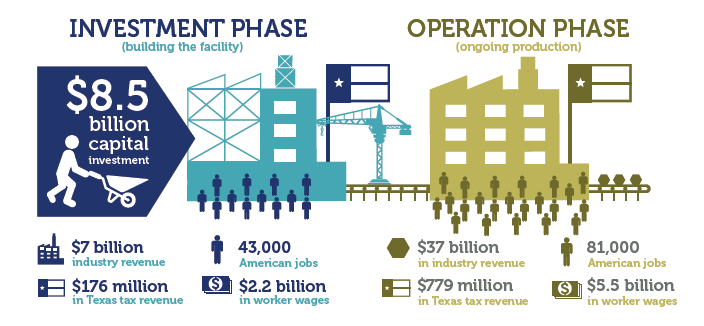Jobs, Jobs and More Jobs – The Petrochemical Industry is Booming along the Texas Gulf Coast
It’s difficult to go even a week without hearing about the country’s job situation, but Texas is telling a different story altogether. As the country looks to energy self-sufficiency, the pressure is on in Texas to meet the oncoming demand. But, that is a task with which the state is very familiar. The petrochemical industry in Texas has a long history that begins before the 1950s. During the 1990s, petrochemical facilities in Texas dominated the market – leading the nation in production.
Today, Texas is still the largest chemical producing state, and with production estimates valued at $37 billion this year, it will maintain that position. What makes Texas perfect for petrochemical production? Primarily, access to shale gas deposits and deep water coastal ports, available infrastructure, and the established university system.
Energy companies are poised to fully support the expansion of the petrochemical industry in Texas, and it will transform the region with a two-phase job growth plan. Companies like ExxonMobil have an $8.5 billion capital investment and need more facilities that will call for 43,000 new jobs! The second phase encompasses the management and operations to keep these facilities running at optimal levels. It is estimated that this phase will create 81,000 jobs and will lift Texas’s tax revenue by $779 million.

So what’s the catch? This: There aren’t enough qualified people to fill the incoming job demands! Companies are scrambling in search of individuals with the right skillsets. That’s why the Texas Gulf Coast Consortium of Community Colleges (TGCCCC) and ExxonMobil are spearheading the Community College Petrochemical Initiative (CCPI) to attract people to take advantage of these new opportunities.
There is a common misconception that you need a four-year degree to work in the energy industry or even a master’s level degree for a management position. Students in a CCPI program can receive their two-year associate degree and start immediately in their career upon graduation. And the best part is: In the investment and operation phase, there will be $7.7 billion in employee wages. For petrochemical manufacturing jobs alone, the average wage is $99,700 which is 46 percent more than the average manufacturing wage in other industries.
Jobs in the petrochemical field are often perceived to be hard, manual labor positions. However, many are in office environments with regular business hours. Below are the careers paths students can take in the CCPI program:
- Analyzer Technology
- CADD
- Computer Maintenance
- Electrical Technology
- Engineering Technology
- Fieldbus Technology
- Instrumentation
- Machine Technology
- Millwrighting
- Pipefitting
- Process Technology
- Production Technology
- Supply Chain Management
- Welding
Teachers are also needed to help educate the next wave of petrochemical professionals. Each of our nine partner schools has openings for full or part-time instructors – with or without previous teaching experience. If you are an experienced professional in any of the course areas listed above, please reach out to our schools for job postings and salary information.
The Community College Petrochemical Initiative is an attractive opportunity for people living in the Gulf Coast region, people who want to start a new career with better future prospects and higher wages, and for veterans returning from active duty. Representatives of TGCCCC and its partner schools will host various recruitment sessions about CCPI throughout the year. To contact a school directly about their specific program offerings, visit our member college directory.
